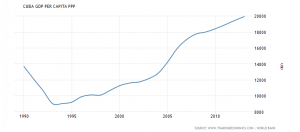The much anticipated death of Fidel Castro will have a profound effect on the future of Cuba but could also influence events across the Western Hemisphere. Beyond the rhetoric, the Cuban reality offers a fascinating contrast to both the neo-liberal recipe for economic and human progress and also that of the socialist state.
 The reality is that Cuba is at the same time completely broke and also one of the richest countries in the region in terms of human progress if that is measured by education and access to health care. With GDP per capita currently at just over $ 5,300 according to trading economics, a web site, , Cuba is a very poor country. If one looks at purchasing power parity, on the other hand, i.e. what one can actually buy in Cuba, its GDP per capita is closer to $ 20,000 which makes it actually quite rich.
The reality is that Cuba is at the same time completely broke and also one of the richest countries in the region in terms of human progress if that is measured by education and access to health care. With GDP per capita currently at just over $ 5,300 according to trading economics, a web site, , Cuba is a very poor country. If one looks at purchasing power parity, on the other hand, i.e. what one can actually buy in Cuba, its GDP per capita is closer to $ 20,000 which makes it actually quite rich.
Most observers, however agree that Cuba is poor and would point to the abject poverty to say that Fidel Castro’s revolution was a failure, at least in economic terms.
How to Measure Human Progress?
The thing is while Cuba’s overall poverty is clear, it does have the best education and public health system in the region and few Cubans go hungry. This can not be said for the apparently richer and more capitalist countries in the region.
The current President Elect of the United States, Donald Trump, referred to Fidel as a Brutal Dictator and in typical form appears to know nothing about Cuban history or the social progress that the revolution has achieved. In classic form, U.S president Barak Obama made a statement which was much more nuanced and called Fidel a “singular figure” that “history will judge”.
What’s Next for Cuba and the Region ?
Regardless of whether the recounts in Wisconsin, Pennsylvania, and Michigan finally give the U.S. election to Trump or Clinton, the most likely scenario is that the United States will end the embargo against Cuba and the island will open up for investment.

After his death, the left leaning populist leaders of Venezuela, Bolivia, and Ecuador all made heart rendering expressions of grief and solidarity with the Cuban people but the reality is that Fidel’s 81 year old Brother Raul has already said he will retire at the end of his term in 2018. According to the New York Times, his likely successor will be Daniel Díaz-Canel, who is currently Vice President and would logically attempt to keep the regime intact much like Nicolas Maduro has done in Venezuela.
Two years ago I wrote a post speculating about the possible scenarios for the future of Cuba and as that scenario appears to play out, the future of the island and maybe the region will be affected.
War or Peace ?
The real question is whether the transition to a post Castro Cuba will happen peacefully and if so in which direction. Assuming the U.S. lifts the embargo, how will Cuba deal with millions of dollars of investment pouring into the country? Cuba, as a whole might get rich, but will it be able to keep its social services sector at their current level or will it begin to resemble other Latin American economies which are defined by rich and poor?
Will Díaz-Canel, or whoever ends up running Cuba, continue to support Venezuela and Bolivia ?
In a a larger context, assuming that Trump does survive the recounts, the Organization of American States will, most likely, take an increasingly independent perspective with respect to the U.S. If the United States draws inward, it is likely that China will continue to fill the void as it is currently doing in Venezuela and Bolivia as well as other countries.
While it is possible that someone can figure out how to combine capitalist prosperity with socialist social services, my fear is that Cuba and the region will continue to be presented with only two choices. Capitalist wealth with glaring inequality or socialist poverty with great schools and health care.


Hmm…..I see you drank the Kool-aid. In terms of literacy Cuba rates with most other Caribbean nations – Bahamas, Bermuda, Jamaica. It’s education system is no better or worse than any of these. On health, well what do you believe? – the statistics put out by the Cuban state or the observation by most Cubans that the health system is a shambles, with broken facilities, unmaintained machinery, lack of water, endless queues and an incredibly low efficiency rate of medics (there is an oversupply of medics in Cuba)…..for more of this take a look at MIT’s Conversation – http://alturl.com/kho8k